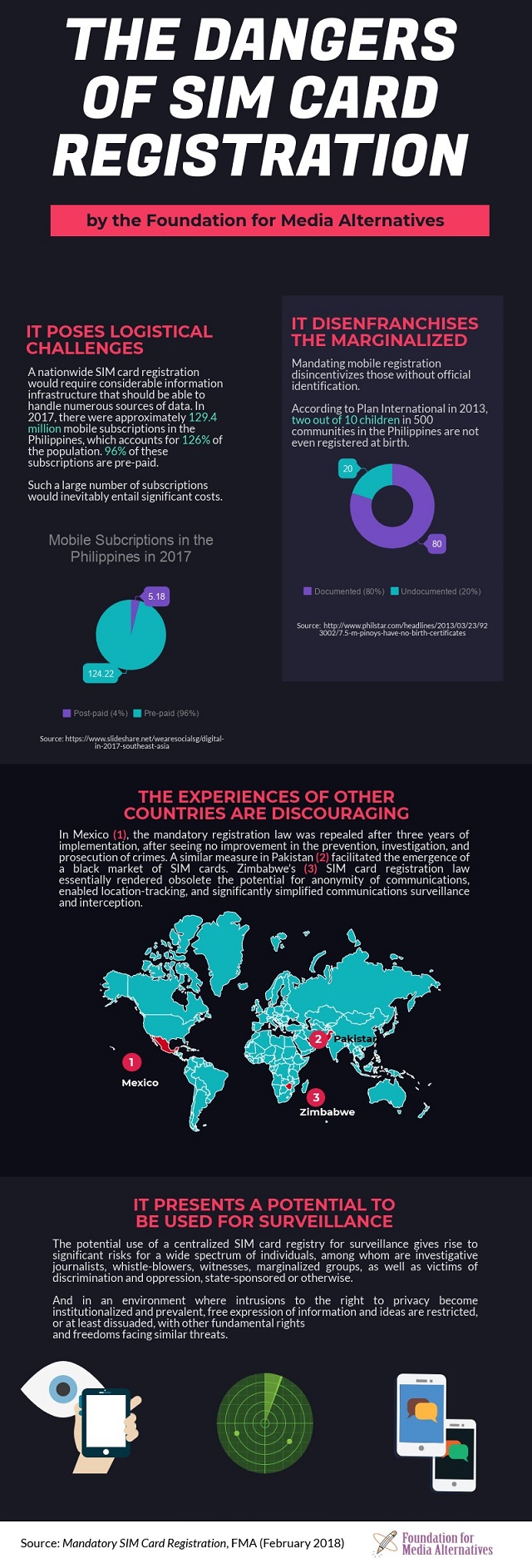I had always batted for registration of cellphone SIM (subscriber identity module) to get rid of mobile phone scammers and bullies.
My belief has been challenged by the briefing paper of the Foundation for Media Alternatives (FMA)(Briefing Paper – SIM Card Registration – FINAL(1)) which states that based on their studies of actual experiences of other countries where SIM is registered, the risks outweighs the perceived benefits.

FMA is a civil society organization whose aim is to assist civil society organizations and other development stakeholders in promoting and defending their right to information and communication.
At this time when Philippine democracy is being undermined under a leadership that disdains human rights, FMA warned that SIM registration, which is being pushed by some legislators, could be used for surveillance against those belonging to at-risk groups or sectors such as journalists, whistleblowers, witnesses, and victims of discrimination and oppression.
The FMA said, “An environment where intrusions to privacy become institutionalized and prevalent, inevitably poses a significant risk to other fundamental rights and freedoms, such as free speech, freedom of assembly, and right to information, just to name a few.”
As an overview, FMA said, “SIM card registration is mandatory in around 90 countries today. Its role in law enforcement, particularly when combating crime and terrorism, is often cited by proponents as sufficient justification for its adoption even sans solid empirical evidence. Meanwhile, not only is it a costly and difficult endeavor, it also poses numerous risks to data protection and every individual’s right to privacy.”
Other highlights of the FMA briefing paper:
• Crime-fighting Myth. The theory that SIM card registration is a boon for law enforcement has been consistently debunked across jurisdictions. The experiences of many countries have demonstrated numerous ways through which criminals are able to circumvent this type of regulation. In some regions, registration actually increased the prevalence of some crimes and even facilitated the emergence of black markets. The case of Pakistan is worth noting. In 2014, law enforcement authorities there recovered SIM cards supposedly used by militants in a terrorist attack. The cards were eventually traced to unsuspecting individuals with no connection to the incident.
• Logistical Nightmare. SIM card registration also poses many implementation challenges to mobile service providers and the concerned government agencies. Here in the Philippines, figures from 2017 show that there were approximately 129.4 million mobile subscriptions in the country, which accounts for 126% of the population.
Logistical practicalities in the registration process should also be considered. A huge portion of the population, especially among the marginalized groups, do not have existing valid identification documents, and requiring such for SIM card registration is bound to increase applications for government-issued identification. And then, there is the availability of equipment and physical capacity of the government and telcos to process registration.
• Specter of Surveillance. Perhaps the most alarming risk of mandatory SIM card registration is its potential use for surveillance. This gives rise to significant risks for a wide spectrum of individuals, among whom are investigative journalists, whistle-blowers, witnesses, marginalized groups, as well as victims of discrimination and oppression, state-sponsored or otherwise.
In its 2014 State of Privacy report, Privacy International noted how Zimbabwe’s SIM card registration law essentially rendered obsolete the potential for anonymity of communications, enabled location-tracking, and significantly simplified communications surveillance and interception.
What makes matters worse is that in an environment where intrusions to the right to privacy become institutionalized and prevalent, free expression of information and ideas are restricted, or at least dissuaded, with other fundamental rights and freedoms facing similar threats.
• Disenfranchising the Marginalized. A lesser known but equally relevant issue is how SIM card registration can also cause a ―chilling effect‖ on mobile phone use. Logistical difficulties, financial costs, and the privacy risks connected with the registration process will inevitably affect people’s purchase and use of SIM cards. This could potentially lead to some sectors or populations getting disincentivized or discriminate upon as a consequence. Take the case of persons with limited mobility (e.g., handicapped, resident of remote areas, etc.) who will be placed at a clear disadvantage if registration requires personal appearance on the part of the registrant. The presentation of identification documents as a prerequisite would also exclude those without official identification—a fairly common scenario in developing countries which usually have poor identification systems.
FMA enjoins the public to remain vigilant and resist any or all measures that aim to narrow individual space for privacy and other related rights and freedoms.
Kalokohan na privacy ang sinasabi ng FMA. SIM registration protects the privacy and security of the ownwer from scammers.
Para din silang CHR na mas pabor na bigyang proteksiyon ang kriminal kesa inosenteng biktima.
*OWNER